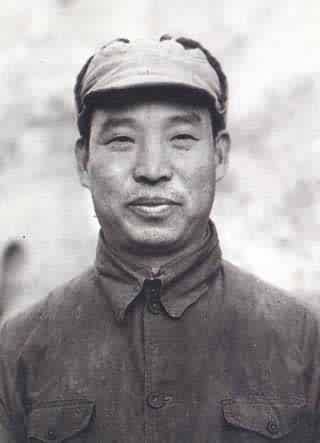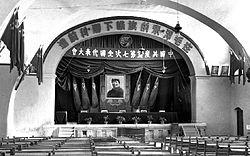
The Chinese Communist Party (CCP), officially the Communist Party of China (CPC), is the founding and sole ruling party of the People's Republic of China (PRC). Under the leadership of Mao Zedong, the CCP emerged victorious in the Chinese Civil War against the Kuomintang. In 1949, Mao proclaimed the establishment of the People's Republic of China. Since then, the CCP has governed China and has had sole control over the People's Liberation Army (PLA). Successive leaders of the CCP have added their own theories to the party's constitution, which outlines the party's ideology, collectively referred to as socialism with Chinese characteristics. As of 2023, the CCP has more than 98 million members, making it the second largest political party by membership in the world after India's Bharatiya Janata Party.

Mao Zedong was a Chinese politician, Marxist theorist, military strategist, poet, and revolutionary who was the founder of the People's Republic of China (PRC). He led the country from its establishment in 1949 until his death in 1976, while also serving as the chairman of the Chinese Communist Party during that time. His theories, military strategies and policies are known as Maoism.

The time period in China from the founding of the People's Republic in 1949 until Mao's death in 1976 is commonly known as Maoist China and Red China. The history of the People's Republic of China is often divided distinctly by historians into the Mao era and the post-Mao era. The country's Mao era lasted from the founding of the People's republic on 1 October 1949 to Deng Xiaoping's consolidation of power and policy reversal at the Third Plenum of the 11th Party Congress on 22 December 1978. The Mao era focuses on Mao Zedong's social movements from the early 1950s on, including land reform, the Great Leap Forward and the Cultural Revolution. The Great Chinese Famine, one of the worst famines in human history, occurred during this era.

Peng Dehuai was a Chinese military leader who served as China's defense minister from 1954 to 1959. Peng was born into a poor peasant family, and received several years of primary education before his family's poverty forced him to suspend his education at the age of ten, and to work for several years as a manual laborer. When he was sixteen, Peng became a professional soldier. Over the next ten years Peng served in the armies of several Hunan-based warlord armies, raising himself from the rank of private second class to major. In 1926, Peng's forces joined the Kuomintang, and Peng was first introduced to communism. Peng participated in the Northern Expedition, and supported Wang Jingwei's attempt to form a left-leaning Kuomintang government based in Wuhan. After Wang was defeated, Peng briefly rejoined Chiang Kai-shek's forces before joining the Chinese Communist Party (CCP), allying himself with Mao Zedong and Zhu De.

The Sino-Soviet split was the gradual deterioration of relations between the People's Republic of China (PRC) and the Union of Soviet Socialist Republics (USSR) during the Cold War. This was primarily caused by doctrinal divergences that arose from their different interpretations and practical applications of Marxism–Leninism, as influenced by their respective geopolitics during the Cold War of 1947–1991. In the late 1950s and early 1960s, Sino-Soviet debates about the interpretation of orthodox Marxism became specific disputes about the Soviet Union's policies of national de-Stalinization and international peaceful coexistence with the Western Bloc, which Chinese founding father Mao Zedong decried as revisionism. Against that ideological background, China took a belligerent stance towards the Western world, and publicly rejected the Soviet Union's policy of peaceful coexistence between the Western Bloc and Eastern Bloc. In addition, Beijing resented the Soviet Union's growing ties with India due to factors such as the Sino-Indian border dispute, and Moscow feared that Mao was too nonchalant about the horrors of nuclear warfare.

Peng Zhen was a leading member of the Chinese Communist Party. He led the party organization in Beijing following the victory of the Communists in the Chinese Civil War in 1949, but was purged during the Cultural Revolution for opposing Mao's views on the role of literature in relation to the state. He was rehabilitated under Deng Xiaoping in 1982 along with other 'wrongly accused' officials, and became the inaugural head of the Central Political and Legal Affairs Commission.

On the Ten Major Relationships is a speech by Mao Zedong which outlines how the People's Republic of China would construct socialism different from the model of development undertaken by the Soviet Union. It was delivered by Mao during an enlarged session of a Politburo meeting of the Chinese Communist Party on April 25, 1956 and further elaborated in the 7th Supreme State Conference on May 2 the same year.

The Yan'an Rectification Movement was a political mass movement led by the Chinese Communist Party (CCP) from 1942 to 1945. The movement took place in the Yan'an Soviet, a revolutionary base area centered on the remote city of Yan'an. Although it was during the Second Sino-Japanese War, the CCP was experiencing a time of relative peace when they could focus on internal affairs.

The Four Pests campaign, was one of the first actions taken in the Great Leap Forward in China from 1958 to 1962. Authorities targeted four pests for elimination: rats, flies, mosquitoes, and sparrows. The extermination of sparrows – also known as the smash sparrows campaign or the eliminate sparrows campaign – resulted in severe ecological imbalance, being one of the causes of the Great Chinese Famine of 1959–1961. In 1960 the campaign against sparrows ended and bed bugs became an official target.
New Democracy, or the New Democratic Revolution, is a concept based on Mao Zedong's Bloc of Four Social Classes theory in post-revolutionary China which argued originally that democracy in China would take a path that was decisively distinct from that in any other country. He also said every colonial or semi-colonial country would have its own unique path to democracy, given that particular country's own social and material conditions. Mao labeled representative democracy in the Western nations as Old Democracy, characterizing parliamentarianism as just an instrument to promote the dictatorship of the bourgeoisie/land-owning class through manufacturing consent. He also found his concept of New Democracy in contrast with the Soviet-style dictatorship of the proletariat which he assumed would be the dominant political structure of a post-capitalist world. Mao spoke about how he wanted to create a New China, a country freed from the feudal and semi-feudal aspects of its old culture as well as Japanese imperialism.
On Protracted War is a work comprising a series of speeches by Mao Zedong given from May 26, 1938, to June 3, 1938, at the Yenan Association for the Study of the War of Resistance Against Japan. In it, he calls for a protracted people's war, as a means for small revolutionary groups to fight the power of the state.
The 7th Central Committee of the Chinese Communist Party was in session from 1945 to 1956. It was a product of the convening of the 7th National Congress of the Chinese Communist Party. It held six plenary sessions in this 11-year period. It began in June 1945, before the end of the Second Sino-Japanese War, and the resumption of the Chinese Civil War. This committee would be succeeded by the 8th Central Committee.
The 6th Central Committee of the Chinese Communist Party was in session from 1928 to 1945, during most of the Chinese Civil War, and during the Second Sino-Japanese War. It held seven plenary sessions in this period. It was formally preceded by the 5th Central Committee of the Chinese Communist Party. It was the first central committee to have Mao Zedong as a high-ranking member. It was succeeded by the 7th Central Committee.

Political power grows out of the barrel of a gun is a phrase which was coined by Chinese communist leader Mao Zedong. The phrase was originally used by Mao during an emergency meeting of the Chinese Communist Party (CCP) on 7 August 1927, at the beginning of the Chinese Civil War.

The Chinese Communist Revolution was a social and political revolution that culminated in the establishment of the People's Republic of China in 1949. For the preceding century, China had faced escalating social, economic, and political problems as a result of Western imperialism, Japanese imperialism, and the decline of the Qing dynasty. Cyclical famines and an oppressive landlord system kept the large mass of rural peasantry poor and politically disenfranchised. The Chinese Communist Party (CCP) was formed in 1921 by young urban intellectuals inspired by European socialist ideas and the success of the Bolshevik Revolution in Russia. The CCP originally allied itself with the nationalist Kuomintang party against the warlords and foreign imperialist forces, but the Shanghai Massacre of Communists ordered by Kuomintang (KMT) leader Chiang Kai-shek in 1927 forced them into the Chinese Civil War spanning more than two decades.
Socialism with Chinese characteristics is a set of political theories and policies of the Chinese Communist Party (CCP) that are seen by their proponents as representing Marxism–Leninism adapted to Chinese circumstances and specific time periods, consisting of Deng Xiaoping Theory, Three Represents, Scientific Outlook on Development, and Xi Jinping Thought. According to CCP doctrine, Xi Jinping Thought is considered to represent Marxist–Leninist policies suited for China's present condition while Deng Xiaoping Theory was considered relevant for the period when it was formulated.
The Chinese Communist Party (CCP) frames its ideology as Marxism adapted to the historical context of China, often expressing it as socialism with Chinese characteristics. Major ideological contributions of the CCP's leadership are viewed as "Thought" or "Theory," with "Thought" carrying greater weight. Influential concepts include Mao Zedong Thought, Deng Xiaoping Theory, and Xi Jinping Thought. Other important concepts include the socialist market economy, Jiang Zemin's idea of the Three Represents, and Hu Jintao's Scientific Outlook on Development.
The organization of the Chinese Communist Party (CCP) is based upon the Leninist concept of democratic centralism.

Democratic centralism is the organisational principle of communist states and of most communist parties. In practice, democratic centralism means that political decisions reached by voting processes are binding upon all members of the political party. It is mainly associated with Leninism, wherein the party's political vanguard of revolutionaries practice democratic centralism to select leaders and officers, determine policy, and execute it.
"On the Great Road", commonly known as We Walk on the Great Road, is a Chinese patriotic song written and composed by Li Jiefeng in 1962 and published the following year. The song alludes to the metaphorical road to development for the Chinese people and state after the Great Leap Forward, as well as to the Long March undertaken by Mao Zedong and the Chinese Communist Party in 1934. We Walk on the Great Road was a popular patriotic songs during the Cultural Revolution, and its optimistic tone and simple lyrics cemented it as one of the most popular and enduring patriotic songs of the era, being ranked by the Chinese National Culture Promotion Association as one of the 124 greatest Chinese musical works. Notably, the song was sung extensively during the transfer of sovereignty over Hong Kong, and featured prominently in the 50th Anniversary of the People's Republic Parade in 1999.













